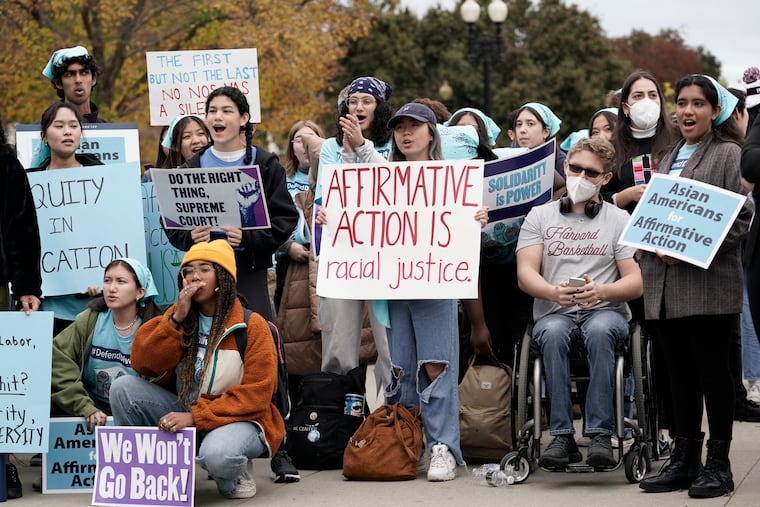Affirmative action’s future waits as SCOTUS hears arguments
Cara McClellan, a University of Pennsylvania law professor, called the cases a “direct attack” on over 40 years of precedent

The Supreme Court heard arguments Monday that could change the admissions process and diversity efforts at colleges across the country.
The court heard two cases surrounding affirmative action — the policy some colleges and universities use to improve educational opportunities for historically underrepresented groups. The cases spotlight the policy at Harvard University and the University of North Carolina.
» READ MORE: 8 issues to watch as the Supreme Court starts its new term
What are the cases about?
In both cases, Students for Fair Admissions — a conservative group — says affirmative action programs violate equal protection ideals and discriminate against Asian Americans.
John C. Yang, president and executive director of Asian Americans Advancing Justice, said SFFA’s opposition “does not speak for Asian Americans.”
“We reject these false narratives rooted in white supremacy to pit communities of color against one another,” he said. “The majority of Asian Americans have consistently supported affirmative action, which allows all students to share their whole story that is inclusive of their identities, histories, and lived experiences.”
Dozens of groups, including the NAACP and the Asian American Legal Defense Fund, said the court needs to continue to uphold affirmative action. According to the NAACP, overturning affirmative action hurts students of color who face inequity throughout their schooling, missing out on opportunities, and “despite being eminently qualified, are not able to gain that competitive edge to assure their admission.”
How are Philadelphia universities and scholars involved?
The University of Pennsylvania filed an amicus brief in support of Harvard and the University of North Carolina’s use of affirmative action. According to the brief, diversity prepares students to be engaged citizens.
Cara McClellan, a University of Pennsylvania law professor and the founding director of the Advocacy for Racial and Civil Justice Clinic, contributed to the NAACP Legal Defense Fund’s amicus brief.
“The Supreme Court has said repeatedly that race can be considered as one of many factors in admissions, so long as the consideration of race is narrowly tailored to serve the compelling interest of pursuing the educational benefits that flow from diversity,” she said. “This means universities can target a general goal of having what’s referred to as a critical mass of underrepresented minority students to combat stereotyping and tokenism.”
McClellan added that Students for Fair Admissions’ claims that race-conscious admissions are unconstitutional is a “direct attack on over 40 years of precedent.”
What’s at stake?
McClellan and others watching Monday’s arguments say that a decision to overturn affirmative action could make an already difficult-to-navigate college admissions process even harder for students of color.
As noted by CNN, affirmative action supporters worry that a Supreme Court comprised of six conservative justices, including three appointed by former President Donald Trump, will eliminate the policy — especially in light of the court’s hot-button decision to overturn Roe v. Wade last term.
Chief Justice John Roberts has already voiced his preference for race-neutral admissions policies.
If affirmative action is banned, McClellan says diverse student population numbers are likely to decrease.
“We also know from the real world, from ‘experiments’ about this from states where race-conscious admissions have ended,” she said.
At least nine states, including Florida, California, and Michigan, have ended affirmative action policies in state universities and colleges.
“In Michigan and California, we know that Black student enrollment has decreased by more than 25% and Latinx student enrollment has decreased by nearly 20%, according to multiple studies,” McClellan said. “Ending race-conscious admissions would thus create a significant barrier to ensuring that students of all backgrounds have access to higher education and to the career pipelines that universities create.”
What happens next?
Case decisions are expected at the end of the court’s term in spring 2023.
Justice Ketanji Brown Jackson will not weigh in for the Harvard case portion, recusing herself to a conflict of interest since she served on Harvard’s board of overseers.